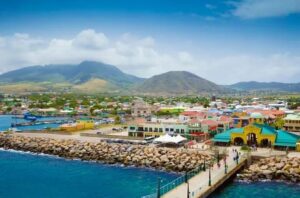Caribbean Economies are looking beyond the Tourism Sector

Photo: Shutterstock
Economic headwinds and global instability have forced many in the Caribbean to recognise the importance of economic diversification. Recent tariffs have become the catalyst for pivoting away from some of the region’s core revenue streams – tourism and citizenship by investment (CBI) programmes – which are increasingly coming under threat.
Tourism is a central component in almost every Caribbean economy. Despite its importance, economies cannot rely on the sector alone. Should the region want to develop faster and more sustainably, it must seek additional revenue streams and in particular those driven by foreign direct investment (FDI).
Island nations have realised that in today’s economic climate, overreliance on tourism revenue limits their economic potential. Instead, what is required are long-term sustainable projects not tied to the tourism season, including but not limited to an expansion of energy and transport infrastructure projects.
These will work in conjunction with the tourism sector to really drive economic growth, not least through the attraction of significant foreign investment which can in turn support CBI programmes.
CBI programmes have long been favoured by many Eastern Caribbean nations such as St Lucia, Dominica, and St. Kitts and Nevis. They offer a significant source of revenue which can consequently be reinvested into island-wide projects including infrastructure, education and energy projects.
However, relying solely on revenue from this one stream is not a sustainable strategy.
Some CBI revenues have seen recent dips, as seen with CBI’s pioneer St. Kitts and Nevis which saw a 60 percent decline in CBI revenue last year which widened its (2024) fiscal deficit to 11 percent of GDP.
Caribbean countries must therefore look to rejuvenate these initiatives by pursuing sustainable development policies, which by their nature require foreign investment and expertise. This will in turn see greater CBI revenue and crucially socioeconomic development.
FDI supports energy and transport infrastructure, upholds employment and enables diversification away from overreliance on tourism, commodities, and CBI programmes.
According to a recent report by the United Nations Conference on Trade and Development (UNCTAD), global FDI reached USD $1.4tn in 2024, an increase of 11 percent from the previous year. However, at 23 percent FDI growth, the Caribbean has demonstrated even more potential than the global average.
Political stability, favourable business climates, strategic geographic locations and well-established legal systems are some benefits offered in Caribbean countries.
As a result of global economic instability, nations are looking to enhance attractiveness to international investors not just from the US but also beyond, perhaps none more so than St. Kitts and Nevis.
Earlier this year, a summit co-hosted by the twin-island federation in Nigeria was attended by both the Prime Minister of St. Kitts and Nevis and Nevis Premier in a move to enhance Africa-Caribbean ties particularly in the agribusiness sector. Building on this, the country hosted a Sustainable Islands Summit in May, where the country championed strategic investment and global partnerships. This has paved the way for the country’s hosting of a forthcoming international investor conference in June.
Nevis Premier Mark Brantley has been particularly vocal about enhancing foreign investment, hinting on several occasions at ‘major’ forthcoming projects on the island. In January he told Forbes that his administration ‘must deliver’ for Nevisians and work to sustain investment which will flow to vital public services including education and healthcare.
In the case of Nevis, the unlocking of the island’s long-awaited geothermal sector could be a true game changer made possible only if demand can meet supply.
Given the region’s persistent challenges with energy insecurity, capitalising on renewable energy could stabilise economies, reduce energy costs and align with sustainable development goals central to regional governments.
The considerable potential of renewable energy is showing reassuring signs of interest, but a limited tourism season is proving to be a bottleneck. For geothermal to be successful, investors require demand which can match the supply. Such demand can only ultimately be driven by large-scale projects which increase the permanent population year-round.
While the Caribbean’s resilience in a turbulent global economic landscape is encouraging, it cannot rest on its laurels. It is critical that the region looks beyond CBI and tourism and embraces large-scale projects which drive foreign investment.
Source: https://www.globalbankingandfinance.com/

MORE NEWS














